Reflective Report: Leadership and Management in Healthcare Setting
VerifiedAdded on 2022/10/06
|10
|2981
|10
Report
AI Summary
This report delves into essential leadership skills for Registered Nurses, emphasizing shared decision-making and relationship management to enhance patient care and staff autonomy. It explores the importance of emotional intelligence and critical thinking in nursing practice, outlining strategies for their development. The report also addresses communication in health informatics, focusing on challenges related to privacy and security in accessing patient medical records, and highlights the role of robot receptionists in improving efficiency and patient-centered care. Furthermore, it examines professional practice issues, specifically role ambiguity, and its impact on nurses, along with self-care strategies for maintaining well-being. The report concludes by underscoring the significance of teamwork and communication skills in achieving nursing goals and providing holistic patient care, supported by relevant references.
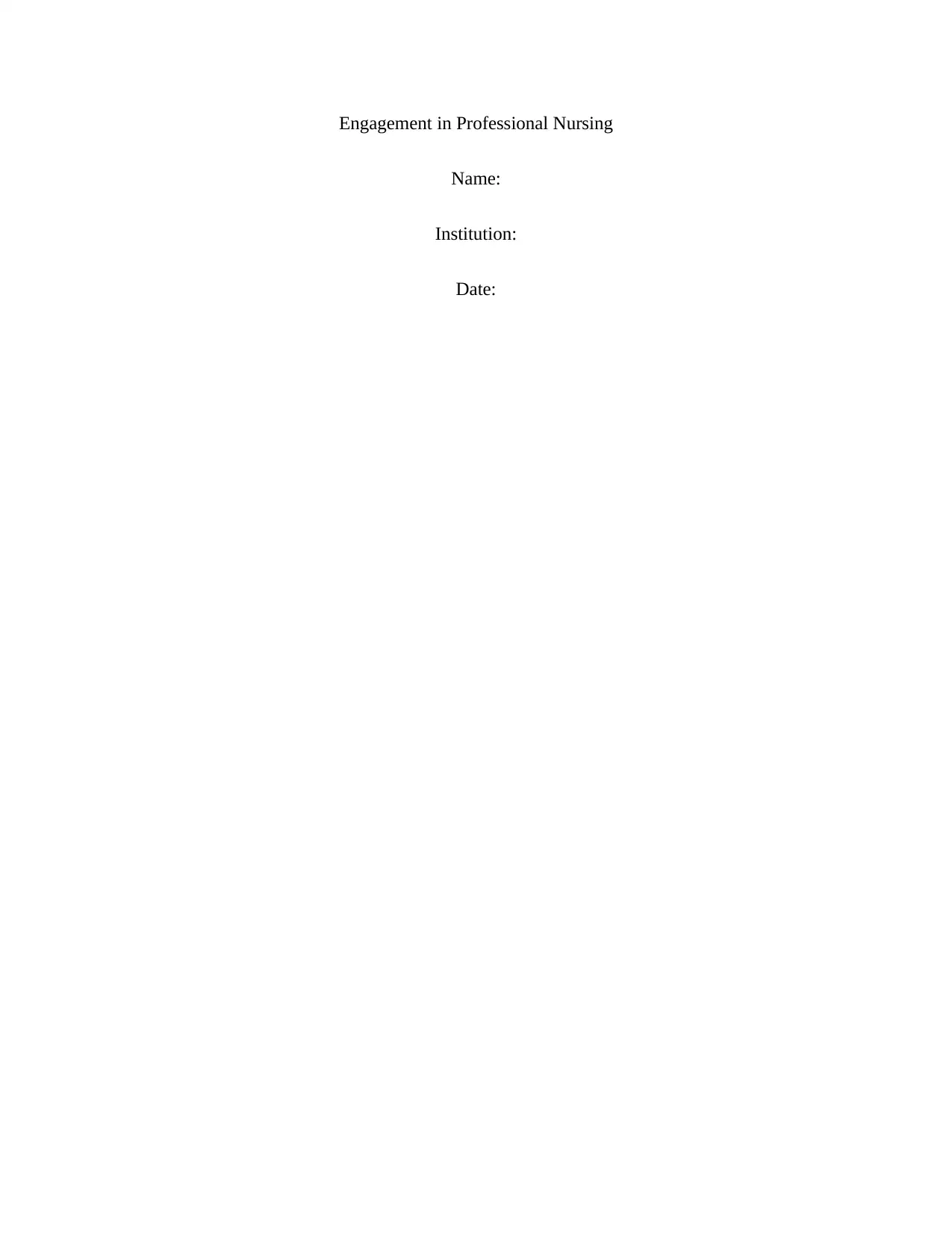
Engagement in Professional Nursing
Name:
Institution:
Date:
Name:
Institution:
Date:
Paraphrase This Document
Need a fresh take? Get an instant paraphrase of this document with our AI Paraphraser
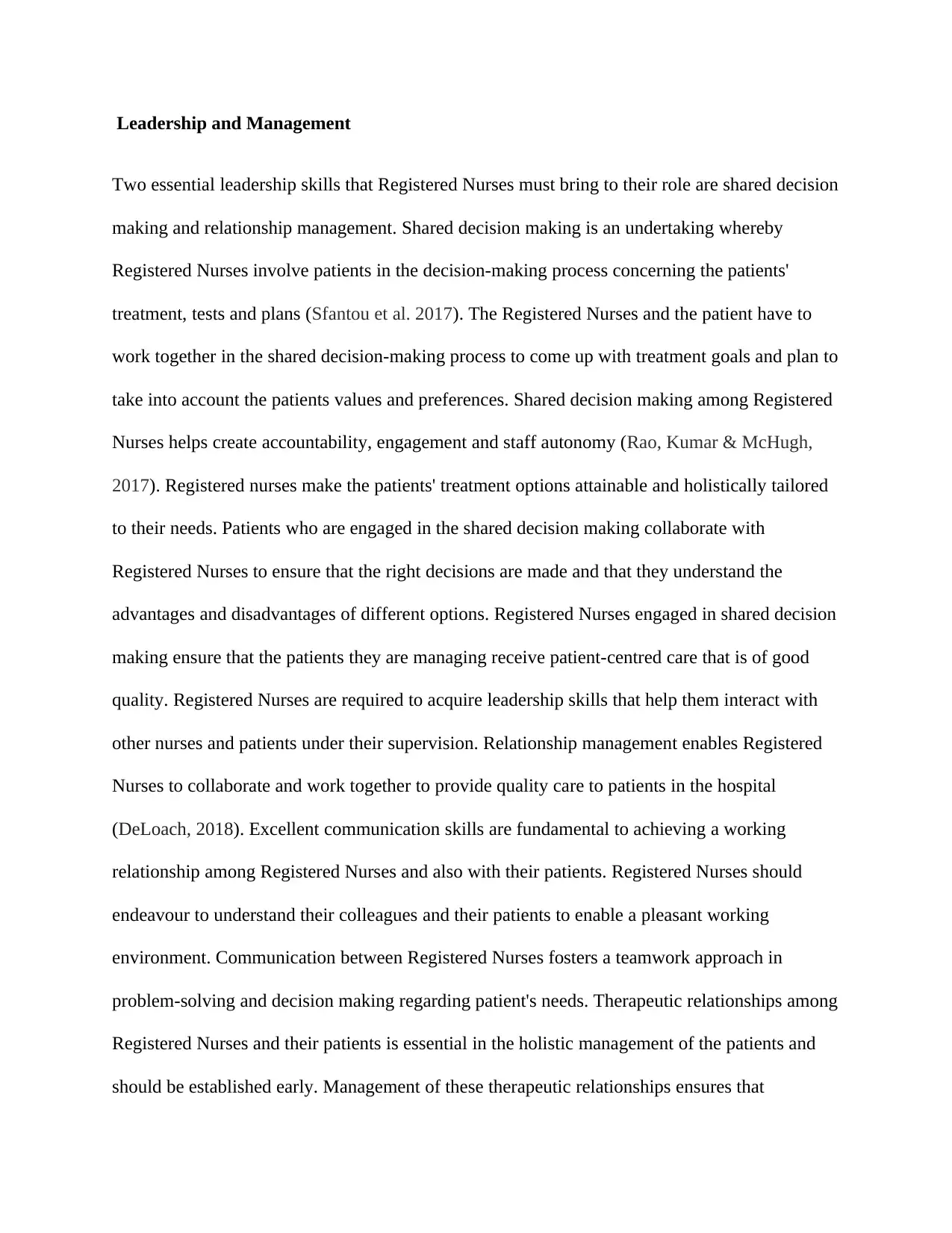
Leadership and Management
Two essential leadership skills that Registered Nurses must bring to their role are shared decision
making and relationship management. Shared decision making is an undertaking whereby
Registered Nurses involve patients in the decision-making process concerning the patients'
treatment, tests and plans (Sfantou et al. 2017). The Registered Nurses and the patient have to
work together in the shared decision-making process to come up with treatment goals and plan to
take into account the patients values and preferences. Shared decision making among Registered
Nurses helps create accountability, engagement and staff autonomy (Rao, Kumar & McHugh,
2017). Registered nurses make the patients' treatment options attainable and holistically tailored
to their needs. Patients who are engaged in the shared decision making collaborate with
Registered Nurses to ensure that the right decisions are made and that they understand the
advantages and disadvantages of different options. Registered Nurses engaged in shared decision
making ensure that the patients they are managing receive patient-centred care that is of good
quality. Registered Nurses are required to acquire leadership skills that help them interact with
other nurses and patients under their supervision. Relationship management enables Registered
Nurses to collaborate and work together to provide quality care to patients in the hospital
(DeLoach, 2018). Excellent communication skills are fundamental to achieving a working
relationship among Registered Nurses and also with their patients. Registered Nurses should
endeavour to understand their colleagues and their patients to enable a pleasant working
environment. Communication between Registered Nurses fosters a teamwork approach in
problem-solving and decision making regarding patient's needs. Therapeutic relationships among
Registered Nurses and their patients is essential in the holistic management of the patients and
should be established early. Management of these therapeutic relationships ensures that
Two essential leadership skills that Registered Nurses must bring to their role are shared decision
making and relationship management. Shared decision making is an undertaking whereby
Registered Nurses involve patients in the decision-making process concerning the patients'
treatment, tests and plans (Sfantou et al. 2017). The Registered Nurses and the patient have to
work together in the shared decision-making process to come up with treatment goals and plan to
take into account the patients values and preferences. Shared decision making among Registered
Nurses helps create accountability, engagement and staff autonomy (Rao, Kumar & McHugh,
2017). Registered nurses make the patients' treatment options attainable and holistically tailored
to their needs. Patients who are engaged in the shared decision making collaborate with
Registered Nurses to ensure that the right decisions are made and that they understand the
advantages and disadvantages of different options. Registered Nurses engaged in shared decision
making ensure that the patients they are managing receive patient-centred care that is of good
quality. Registered Nurses are required to acquire leadership skills that help them interact with
other nurses and patients under their supervision. Relationship management enables Registered
Nurses to collaborate and work together to provide quality care to patients in the hospital
(DeLoach, 2018). Excellent communication skills are fundamental to achieving a working
relationship among Registered Nurses and also with their patients. Registered Nurses should
endeavour to understand their colleagues and their patients to enable a pleasant working
environment. Communication between Registered Nurses fosters a teamwork approach in
problem-solving and decision making regarding patient's needs. Therapeutic relationships among
Registered Nurses and their patients is essential in the holistic management of the patients and
should be established early. Management of these therapeutic relationships ensures that
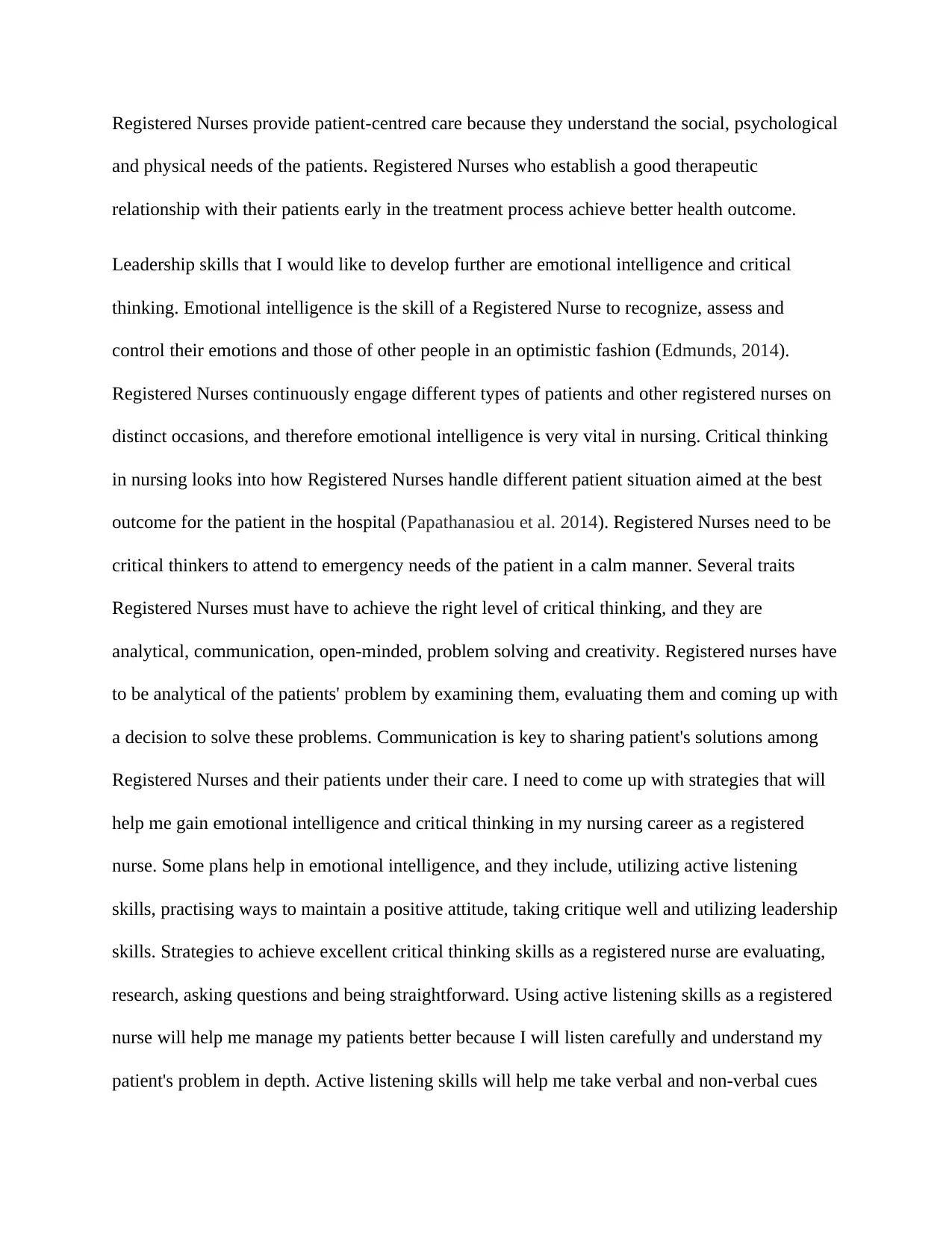
Registered Nurses provide patient-centred care because they understand the social, psychological
and physical needs of the patients. Registered Nurses who establish a good therapeutic
relationship with their patients early in the treatment process achieve better health outcome.
Leadership skills that I would like to develop further are emotional intelligence and critical
thinking. Emotional intelligence is the skill of a Registered Nurse to recognize, assess and
control their emotions and those of other people in an optimistic fashion (Edmunds, 2014).
Registered Nurses continuously engage different types of patients and other registered nurses on
distinct occasions, and therefore emotional intelligence is very vital in nursing. Critical thinking
in nursing looks into how Registered Nurses handle different patient situation aimed at the best
outcome for the patient in the hospital (Papathanasiou et al. 2014). Registered Nurses need to be
critical thinkers to attend to emergency needs of the patient in a calm manner. Several traits
Registered Nurses must have to achieve the right level of critical thinking, and they are
analytical, communication, open-minded, problem solving and creativity. Registered nurses have
to be analytical of the patients' problem by examining them, evaluating them and coming up with
a decision to solve these problems. Communication is key to sharing patient's solutions among
Registered Nurses and their patients under their care. I need to come up with strategies that will
help me gain emotional intelligence and critical thinking in my nursing career as a registered
nurse. Some plans help in emotional intelligence, and they include, utilizing active listening
skills, practising ways to maintain a positive attitude, taking critique well and utilizing leadership
skills. Strategies to achieve excellent critical thinking skills as a registered nurse are evaluating,
research, asking questions and being straightforward. Using active listening skills as a registered
nurse will help me manage my patients better because I will listen carefully and understand my
patient's problem in depth. Active listening skills will help me take verbal and non-verbal cues
and physical needs of the patients. Registered Nurses who establish a good therapeutic
relationship with their patients early in the treatment process achieve better health outcome.
Leadership skills that I would like to develop further are emotional intelligence and critical
thinking. Emotional intelligence is the skill of a Registered Nurse to recognize, assess and
control their emotions and those of other people in an optimistic fashion (Edmunds, 2014).
Registered Nurses continuously engage different types of patients and other registered nurses on
distinct occasions, and therefore emotional intelligence is very vital in nursing. Critical thinking
in nursing looks into how Registered Nurses handle different patient situation aimed at the best
outcome for the patient in the hospital (Papathanasiou et al. 2014). Registered Nurses need to be
critical thinkers to attend to emergency needs of the patient in a calm manner. Several traits
Registered Nurses must have to achieve the right level of critical thinking, and they are
analytical, communication, open-minded, problem solving and creativity. Registered nurses have
to be analytical of the patients' problem by examining them, evaluating them and coming up with
a decision to solve these problems. Communication is key to sharing patient's solutions among
Registered Nurses and their patients under their care. I need to come up with strategies that will
help me gain emotional intelligence and critical thinking in my nursing career as a registered
nurse. Some plans help in emotional intelligence, and they include, utilizing active listening
skills, practising ways to maintain a positive attitude, taking critique well and utilizing leadership
skills. Strategies to achieve excellent critical thinking skills as a registered nurse are evaluating,
research, asking questions and being straightforward. Using active listening skills as a registered
nurse will help me manage my patients better because I will listen carefully and understand my
patient's problem in depth. Active listening skills will help me take verbal and non-verbal cues
⊘ This is a preview!⊘
Do you want full access?
Subscribe today to unlock all pages.

Trusted by 1+ million students worldwide
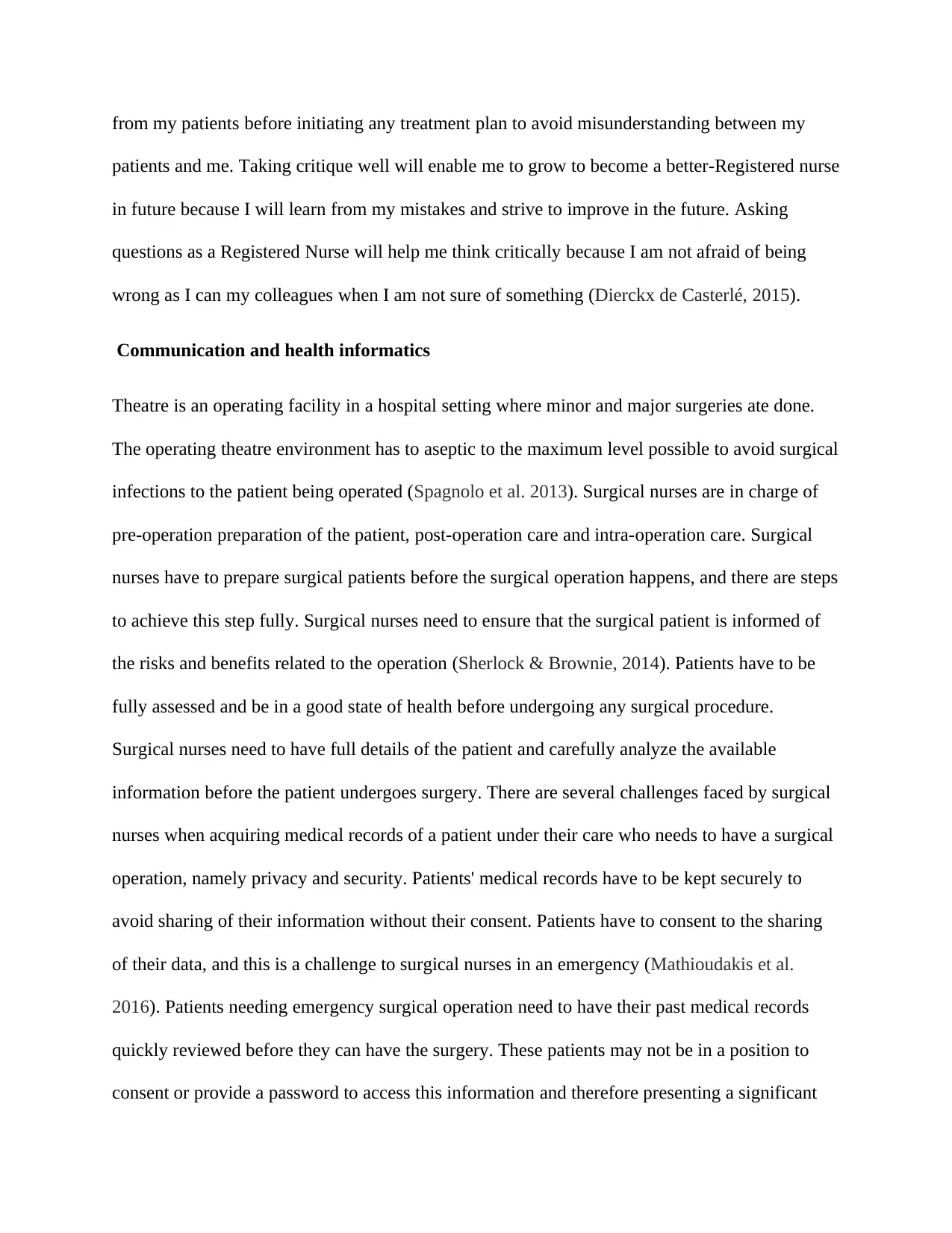
from my patients before initiating any treatment plan to avoid misunderstanding between my
patients and me. Taking critique well will enable me to grow to become a better-Registered nurse
in future because I will learn from my mistakes and strive to improve in the future. Asking
questions as a Registered Nurse will help me think critically because I am not afraid of being
wrong as I can my colleagues when I am not sure of something (Dierckx de Casterlé, 2015).
Communication and health informatics
Theatre is an operating facility in a hospital setting where minor and major surgeries ate done.
The operating theatre environment has to aseptic to the maximum level possible to avoid surgical
infections to the patient being operated (Spagnolo et al. 2013). Surgical nurses are in charge of
pre-operation preparation of the patient, post-operation care and intra-operation care. Surgical
nurses have to prepare surgical patients before the surgical operation happens, and there are steps
to achieve this step fully. Surgical nurses need to ensure that the surgical patient is informed of
the risks and benefits related to the operation (Sherlock & Brownie, 2014). Patients have to be
fully assessed and be in a good state of health before undergoing any surgical procedure.
Surgical nurses need to have full details of the patient and carefully analyze the available
information before the patient undergoes surgery. There are several challenges faced by surgical
nurses when acquiring medical records of a patient under their care who needs to have a surgical
operation, namely privacy and security. Patients' medical records have to be kept securely to
avoid sharing of their information without their consent. Patients have to consent to the sharing
of their data, and this is a challenge to surgical nurses in an emergency (Mathioudakis et al.
2016). Patients needing emergency surgical operation need to have their past medical records
quickly reviewed before they can have the surgery. These patients may not be in a position to
consent or provide a password to access this information and therefore presenting a significant
patients and me. Taking critique well will enable me to grow to become a better-Registered nurse
in future because I will learn from my mistakes and strive to improve in the future. Asking
questions as a Registered Nurse will help me think critically because I am not afraid of being
wrong as I can my colleagues when I am not sure of something (Dierckx de Casterlé, 2015).
Communication and health informatics
Theatre is an operating facility in a hospital setting where minor and major surgeries ate done.
The operating theatre environment has to aseptic to the maximum level possible to avoid surgical
infections to the patient being operated (Spagnolo et al. 2013). Surgical nurses are in charge of
pre-operation preparation of the patient, post-operation care and intra-operation care. Surgical
nurses have to prepare surgical patients before the surgical operation happens, and there are steps
to achieve this step fully. Surgical nurses need to ensure that the surgical patient is informed of
the risks and benefits related to the operation (Sherlock & Brownie, 2014). Patients have to be
fully assessed and be in a good state of health before undergoing any surgical procedure.
Surgical nurses need to have full details of the patient and carefully analyze the available
information before the patient undergoes surgery. There are several challenges faced by surgical
nurses when acquiring medical records of a patient under their care who needs to have a surgical
operation, namely privacy and security. Patients' medical records have to be kept securely to
avoid sharing of their information without their consent. Patients have to consent to the sharing
of their data, and this is a challenge to surgical nurses in an emergency (Mathioudakis et al.
2016). Patients needing emergency surgical operation need to have their past medical records
quickly reviewed before they can have the surgery. These patients may not be in a position to
consent or provide a password to access this information and therefore presenting a significant
Paraphrase This Document
Need a fresh take? Get an instant paraphrase of this document with our AI Paraphraser
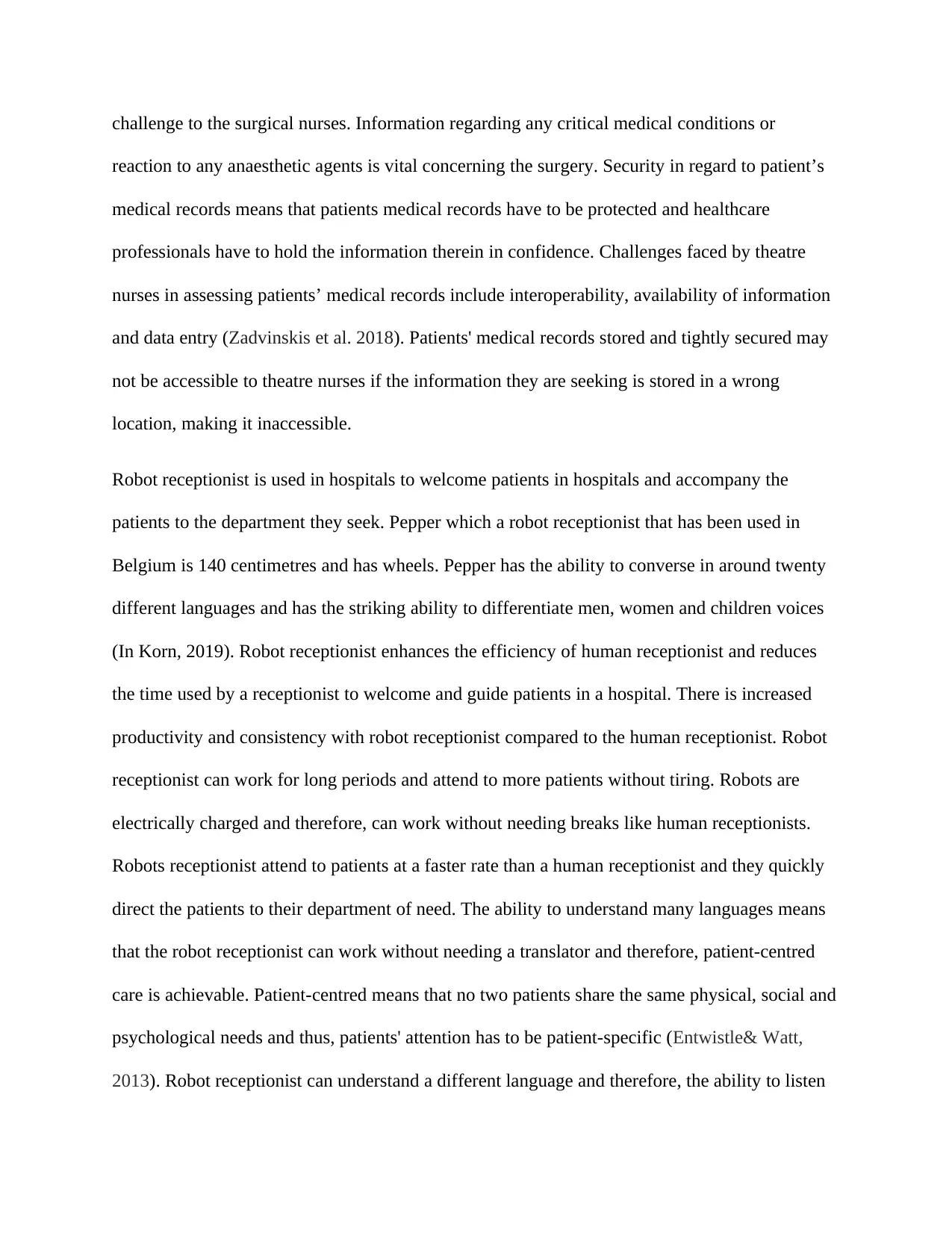
challenge to the surgical nurses. Information regarding any critical medical conditions or
reaction to any anaesthetic agents is vital concerning the surgery. Security in regard to patient’s
medical records means that patients medical records have to be protected and healthcare
professionals have to hold the information therein in confidence. Challenges faced by theatre
nurses in assessing patients’ medical records include interoperability, availability of information
and data entry (Zadvinskis et al. 2018). Patients' medical records stored and tightly secured may
not be accessible to theatre nurses if the information they are seeking is stored in a wrong
location, making it inaccessible.
Robot receptionist is used in hospitals to welcome patients in hospitals and accompany the
patients to the department they seek. Pepper which a robot receptionist that has been used in
Belgium is 140 centimetres and has wheels. Pepper has the ability to converse in around twenty
different languages and has the striking ability to differentiate men, women and children voices
(In Korn, 2019). Robot receptionist enhances the efficiency of human receptionist and reduces
the time used by a receptionist to welcome and guide patients in a hospital. There is increased
productivity and consistency with robot receptionist compared to the human receptionist. Robot
receptionist can work for long periods and attend to more patients without tiring. Robots are
electrically charged and therefore, can work without needing breaks like human receptionists.
Robots receptionist attend to patients at a faster rate than a human receptionist and they quickly
direct the patients to their department of need. The ability to understand many languages means
that the robot receptionist can work without needing a translator and therefore, patient-centred
care is achievable. Patient-centred means that no two patients share the same physical, social and
psychological needs and thus, patients' attention has to be patient-specific (Entwistle& Watt,
2013). Robot receptionist can understand a different language and therefore, the ability to listen
reaction to any anaesthetic agents is vital concerning the surgery. Security in regard to patient’s
medical records means that patients medical records have to be protected and healthcare
professionals have to hold the information therein in confidence. Challenges faced by theatre
nurses in assessing patients’ medical records include interoperability, availability of information
and data entry (Zadvinskis et al. 2018). Patients' medical records stored and tightly secured may
not be accessible to theatre nurses if the information they are seeking is stored in a wrong
location, making it inaccessible.
Robot receptionist is used in hospitals to welcome patients in hospitals and accompany the
patients to the department they seek. Pepper which a robot receptionist that has been used in
Belgium is 140 centimetres and has wheels. Pepper has the ability to converse in around twenty
different languages and has the striking ability to differentiate men, women and children voices
(In Korn, 2019). Robot receptionist enhances the efficiency of human receptionist and reduces
the time used by a receptionist to welcome and guide patients in a hospital. There is increased
productivity and consistency with robot receptionist compared to the human receptionist. Robot
receptionist can work for long periods and attend to more patients without tiring. Robots are
electrically charged and therefore, can work without needing breaks like human receptionists.
Robots receptionist attend to patients at a faster rate than a human receptionist and they quickly
direct the patients to their department of need. The ability to understand many languages means
that the robot receptionist can work without needing a translator and therefore, patient-centred
care is achievable. Patient-centred means that no two patients share the same physical, social and
psychological needs and thus, patients' attention has to be patient-specific (Entwistle& Watt,
2013). Robot receptionist can understand a different language and therefore, the ability to listen
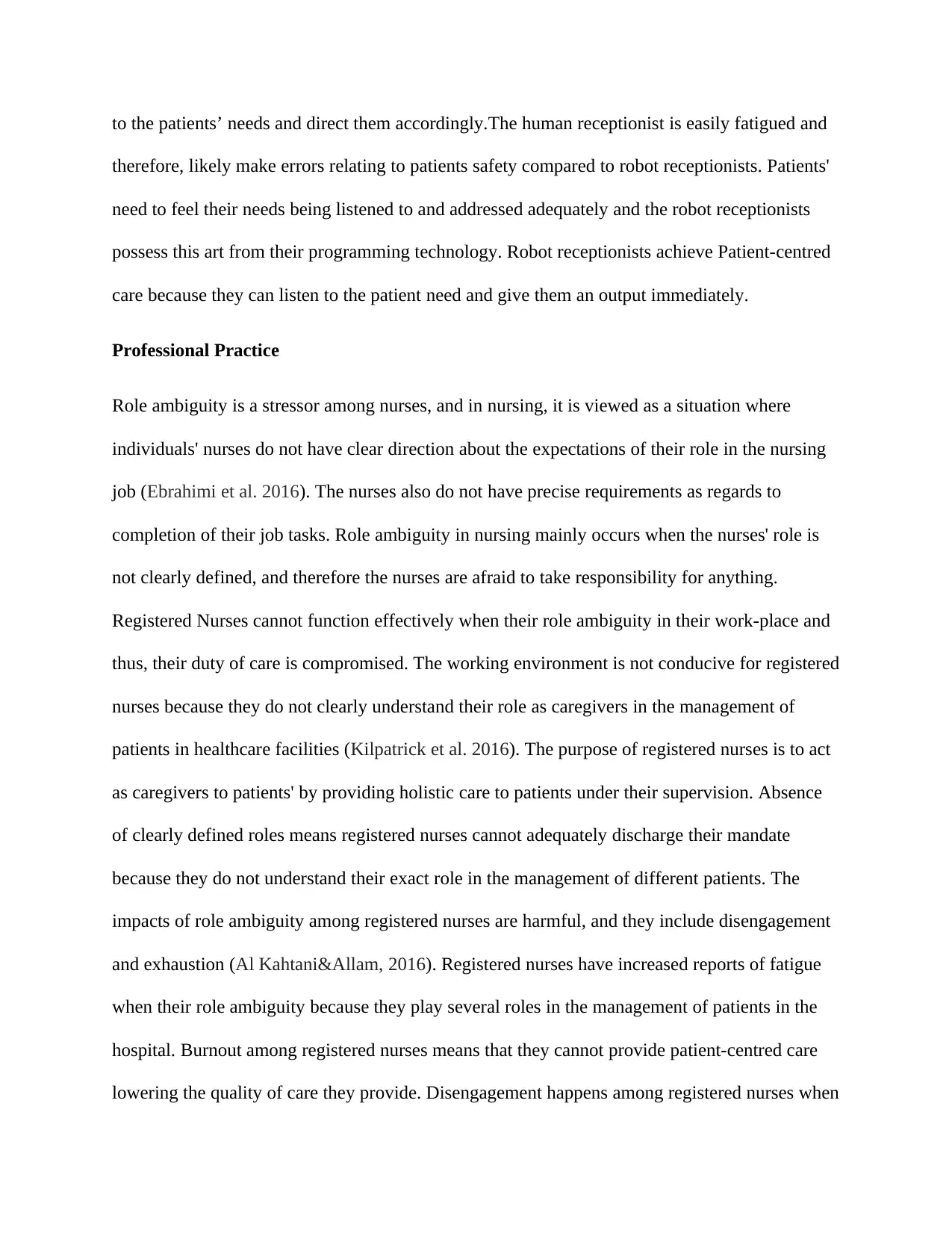
to the patients’ needs and direct them accordingly.The human receptionist is easily fatigued and
therefore, likely make errors relating to patients safety compared to robot receptionists. Patients'
need to feel their needs being listened to and addressed adequately and the robot receptionists
possess this art from their programming technology. Robot receptionists achieve Patient-centred
care because they can listen to the patient need and give them an output immediately.
Professional Practice
Role ambiguity is a stressor among nurses, and in nursing, it is viewed as a situation where
individuals' nurses do not have clear direction about the expectations of their role in the nursing
job (Ebrahimi et al. 2016). The nurses also do not have precise requirements as regards to
completion of their job tasks. Role ambiguity in nursing mainly occurs when the nurses' role is
not clearly defined, and therefore the nurses are afraid to take responsibility for anything.
Registered Nurses cannot function effectively when their role ambiguity in their work-place and
thus, their duty of care is compromised. The working environment is not conducive for registered
nurses because they do not clearly understand their role as caregivers in the management of
patients in healthcare facilities (Kilpatrick et al. 2016). The purpose of registered nurses is to act
as caregivers to patients' by providing holistic care to patients under their supervision. Absence
of clearly defined roles means registered nurses cannot adequately discharge their mandate
because they do not understand their exact role in the management of different patients. The
impacts of role ambiguity among registered nurses are harmful, and they include disengagement
and exhaustion (Al Kahtani&Allam, 2016). Registered nurses have increased reports of fatigue
when their role ambiguity because they play several roles in the management of patients in the
hospital. Burnout among registered nurses means that they cannot provide patient-centred care
lowering the quality of care they provide. Disengagement happens among registered nurses when
therefore, likely make errors relating to patients safety compared to robot receptionists. Patients'
need to feel their needs being listened to and addressed adequately and the robot receptionists
possess this art from their programming technology. Robot receptionists achieve Patient-centred
care because they can listen to the patient need and give them an output immediately.
Professional Practice
Role ambiguity is a stressor among nurses, and in nursing, it is viewed as a situation where
individuals' nurses do not have clear direction about the expectations of their role in the nursing
job (Ebrahimi et al. 2016). The nurses also do not have precise requirements as regards to
completion of their job tasks. Role ambiguity in nursing mainly occurs when the nurses' role is
not clearly defined, and therefore the nurses are afraid to take responsibility for anything.
Registered Nurses cannot function effectively when their role ambiguity in their work-place and
thus, their duty of care is compromised. The working environment is not conducive for registered
nurses because they do not clearly understand their role as caregivers in the management of
patients in healthcare facilities (Kilpatrick et al. 2016). The purpose of registered nurses is to act
as caregivers to patients' by providing holistic care to patients under their supervision. Absence
of clearly defined roles means registered nurses cannot adequately discharge their mandate
because they do not understand their exact role in the management of different patients. The
impacts of role ambiguity among registered nurses are harmful, and they include disengagement
and exhaustion (Al Kahtani&Allam, 2016). Registered nurses have increased reports of fatigue
when their role ambiguity because they play several roles in the management of patients in the
hospital. Burnout among registered nurses means that they cannot provide patient-centred care
lowering the quality of care they provide. Disengagement happens among registered nurses when
⊘ This is a preview!⊘
Do you want full access?
Subscribe today to unlock all pages.

Trusted by 1+ million students worldwide
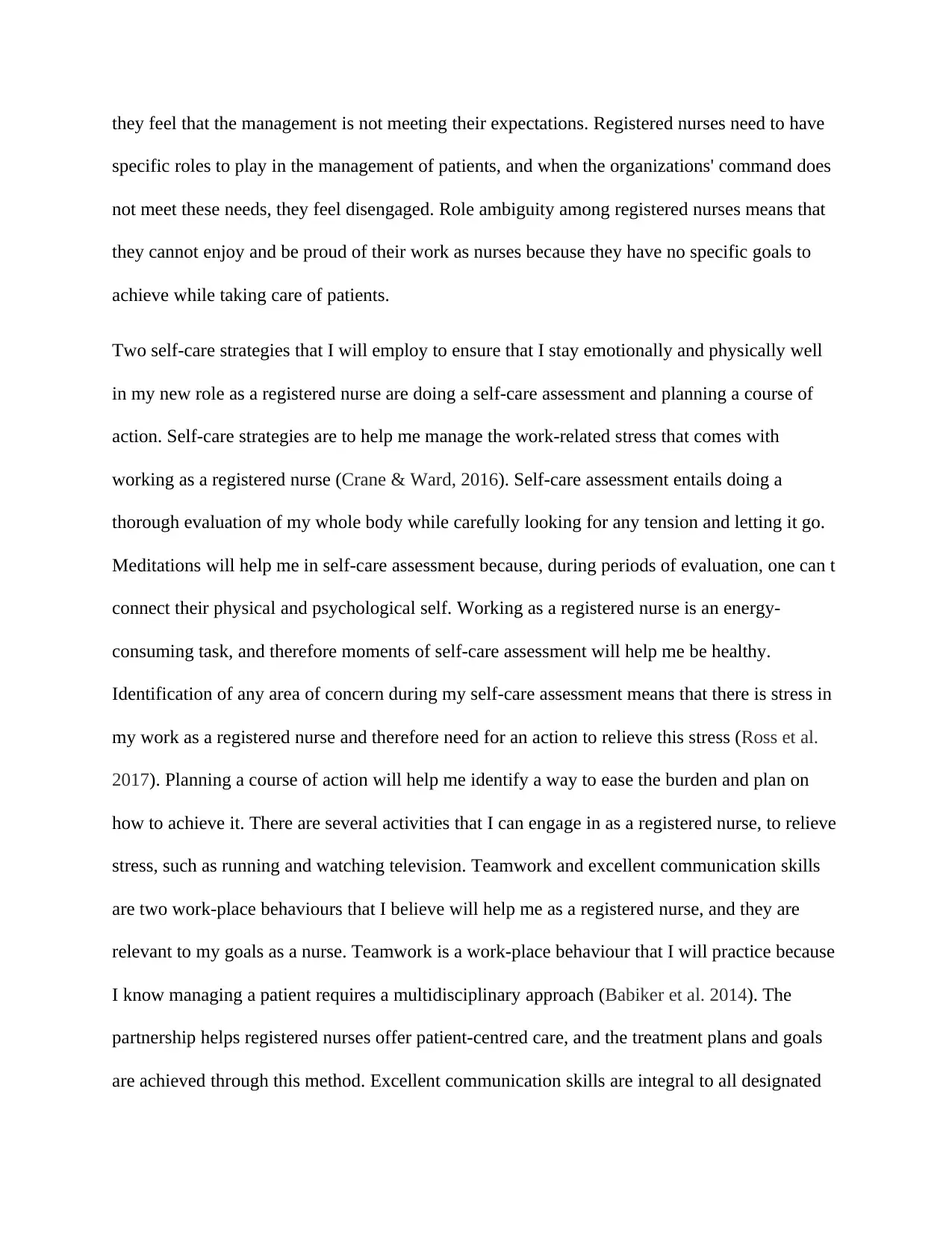
they feel that the management is not meeting their expectations. Registered nurses need to have
specific roles to play in the management of patients, and when the organizations' command does
not meet these needs, they feel disengaged. Role ambiguity among registered nurses means that
they cannot enjoy and be proud of their work as nurses because they have no specific goals to
achieve while taking care of patients.
Two self-care strategies that I will employ to ensure that I stay emotionally and physically well
in my new role as a registered nurse are doing a self-care assessment and planning a course of
action. Self-care strategies are to help me manage the work-related stress that comes with
working as a registered nurse (Crane & Ward, 2016). Self-care assessment entails doing a
thorough evaluation of my whole body while carefully looking for any tension and letting it go.
Meditations will help me in self-care assessment because, during periods of evaluation, one can t
connect their physical and psychological self. Working as a registered nurse is an energy-
consuming task, and therefore moments of self-care assessment will help me be healthy.
Identification of any area of concern during my self-care assessment means that there is stress in
my work as a registered nurse and therefore need for an action to relieve this stress (Ross et al.
2017). Planning a course of action will help me identify a way to ease the burden and plan on
how to achieve it. There are several activities that I can engage in as a registered nurse, to relieve
stress, such as running and watching television. Teamwork and excellent communication skills
are two work-place behaviours that I believe will help me as a registered nurse, and they are
relevant to my goals as a nurse. Teamwork is a work-place behaviour that I will practice because
I know managing a patient requires a multidisciplinary approach (Babiker et al. 2014). The
partnership helps registered nurses offer patient-centred care, and the treatment plans and goals
are achieved through this method. Excellent communication skills are integral to all designated
specific roles to play in the management of patients, and when the organizations' command does
not meet these needs, they feel disengaged. Role ambiguity among registered nurses means that
they cannot enjoy and be proud of their work as nurses because they have no specific goals to
achieve while taking care of patients.
Two self-care strategies that I will employ to ensure that I stay emotionally and physically well
in my new role as a registered nurse are doing a self-care assessment and planning a course of
action. Self-care strategies are to help me manage the work-related stress that comes with
working as a registered nurse (Crane & Ward, 2016). Self-care assessment entails doing a
thorough evaluation of my whole body while carefully looking for any tension and letting it go.
Meditations will help me in self-care assessment because, during periods of evaluation, one can t
connect their physical and psychological self. Working as a registered nurse is an energy-
consuming task, and therefore moments of self-care assessment will help me be healthy.
Identification of any area of concern during my self-care assessment means that there is stress in
my work as a registered nurse and therefore need for an action to relieve this stress (Ross et al.
2017). Planning a course of action will help me identify a way to ease the burden and plan on
how to achieve it. There are several activities that I can engage in as a registered nurse, to relieve
stress, such as running and watching television. Teamwork and excellent communication skills
are two work-place behaviours that I believe will help me as a registered nurse, and they are
relevant to my goals as a nurse. Teamwork is a work-place behaviour that I will practice because
I know managing a patient requires a multidisciplinary approach (Babiker et al. 2014). The
partnership helps registered nurses offer patient-centred care, and the treatment plans and goals
are achieved through this method. Excellent communication skills are integral to all designated
Paraphrase This Document
Need a fresh take? Get an instant paraphrase of this document with our AI Paraphraser
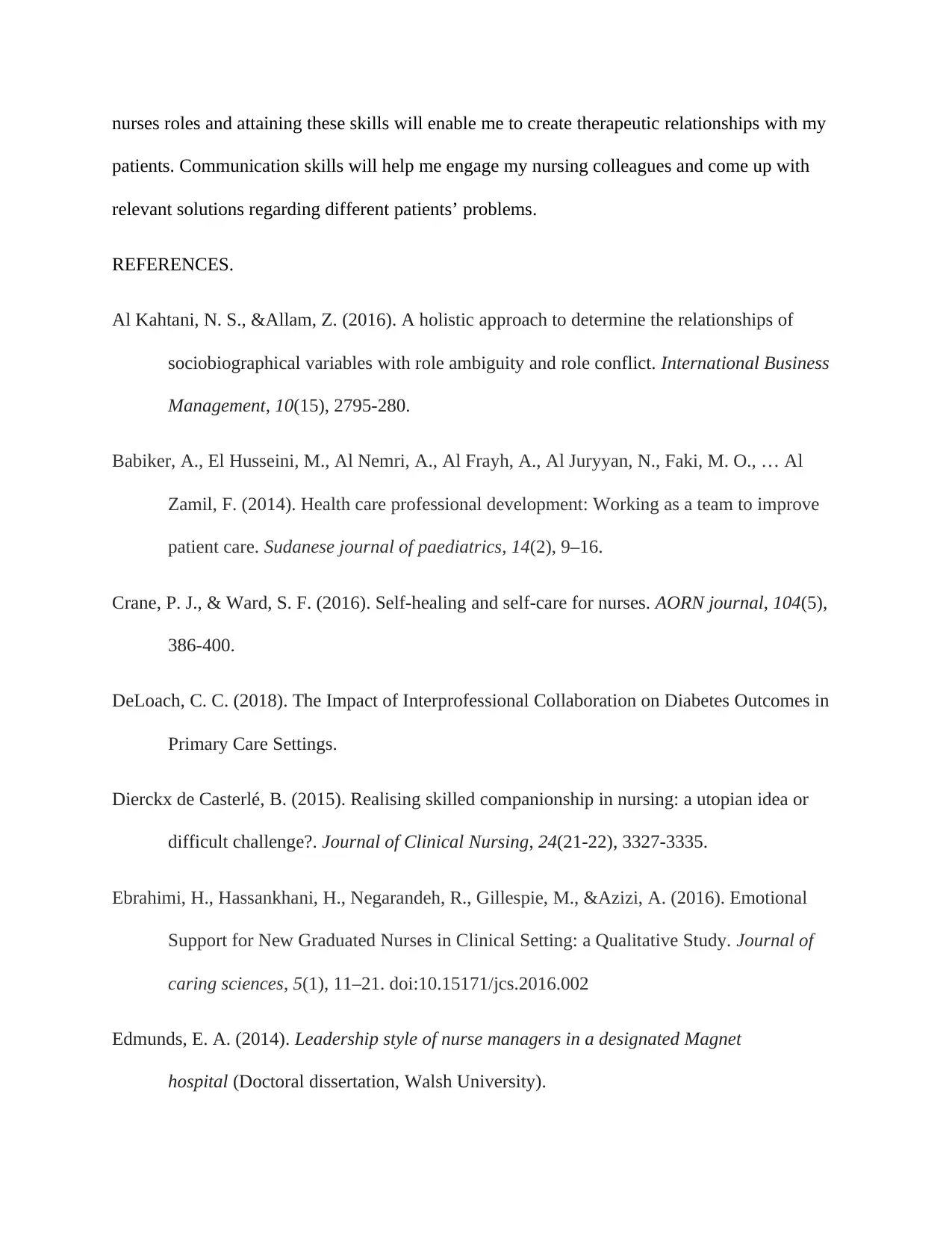
nurses roles and attaining these skills will enable me to create therapeutic relationships with my
patients. Communication skills will help me engage my nursing colleagues and come up with
relevant solutions regarding different patients’ problems.
REFERENCES.
Al Kahtani, N. S., &Allam, Z. (2016). A holistic approach to determine the relationships of
sociobiographical variables with role ambiguity and role conflict. International Business
Management, 10(15), 2795-280.
Babiker, A., El Husseini, M., Al Nemri, A., Al Frayh, A., Al Juryyan, N., Faki, M. O., … Al
Zamil, F. (2014). Health care professional development: Working as a team to improve
patient care. Sudanese journal of paediatrics, 14(2), 9–16.
Crane, P. J., & Ward, S. F. (2016). Self-healing and self-care for nurses. AORN journal, 104(5),
386-400.
DeLoach, C. C. (2018). The Impact of Interprofessional Collaboration on Diabetes Outcomes in
Primary Care Settings.
Dierckx de Casterlé, B. (2015). Realising skilled companionship in nursing: a utopian idea or
difficult challenge?. Journal of Clinical Nursing, 24(21-22), 3327-3335.
Ebrahimi, H., Hassankhani, H., Negarandeh, R., Gillespie, M., &Azizi, A. (2016). Emotional
Support for New Graduated Nurses in Clinical Setting: a Qualitative Study. Journal of
caring sciences, 5(1), 11–21. doi:10.15171/jcs.2016.002
Edmunds, E. A. (2014). Leadership style of nurse managers in a designated Magnet
hospital (Doctoral dissertation, Walsh University).
patients. Communication skills will help me engage my nursing colleagues and come up with
relevant solutions regarding different patients’ problems.
REFERENCES.
Al Kahtani, N. S., &Allam, Z. (2016). A holistic approach to determine the relationships of
sociobiographical variables with role ambiguity and role conflict. International Business
Management, 10(15), 2795-280.
Babiker, A., El Husseini, M., Al Nemri, A., Al Frayh, A., Al Juryyan, N., Faki, M. O., … Al
Zamil, F. (2014). Health care professional development: Working as a team to improve
patient care. Sudanese journal of paediatrics, 14(2), 9–16.
Crane, P. J., & Ward, S. F. (2016). Self-healing and self-care for nurses. AORN journal, 104(5),
386-400.
DeLoach, C. C. (2018). The Impact of Interprofessional Collaboration on Diabetes Outcomes in
Primary Care Settings.
Dierckx de Casterlé, B. (2015). Realising skilled companionship in nursing: a utopian idea or
difficult challenge?. Journal of Clinical Nursing, 24(21-22), 3327-3335.
Ebrahimi, H., Hassankhani, H., Negarandeh, R., Gillespie, M., &Azizi, A. (2016). Emotional
Support for New Graduated Nurses in Clinical Setting: a Qualitative Study. Journal of
caring sciences, 5(1), 11–21. doi:10.15171/jcs.2016.002
Edmunds, E. A. (2014). Leadership style of nurse managers in a designated Magnet
hospital (Doctoral dissertation, Walsh University).
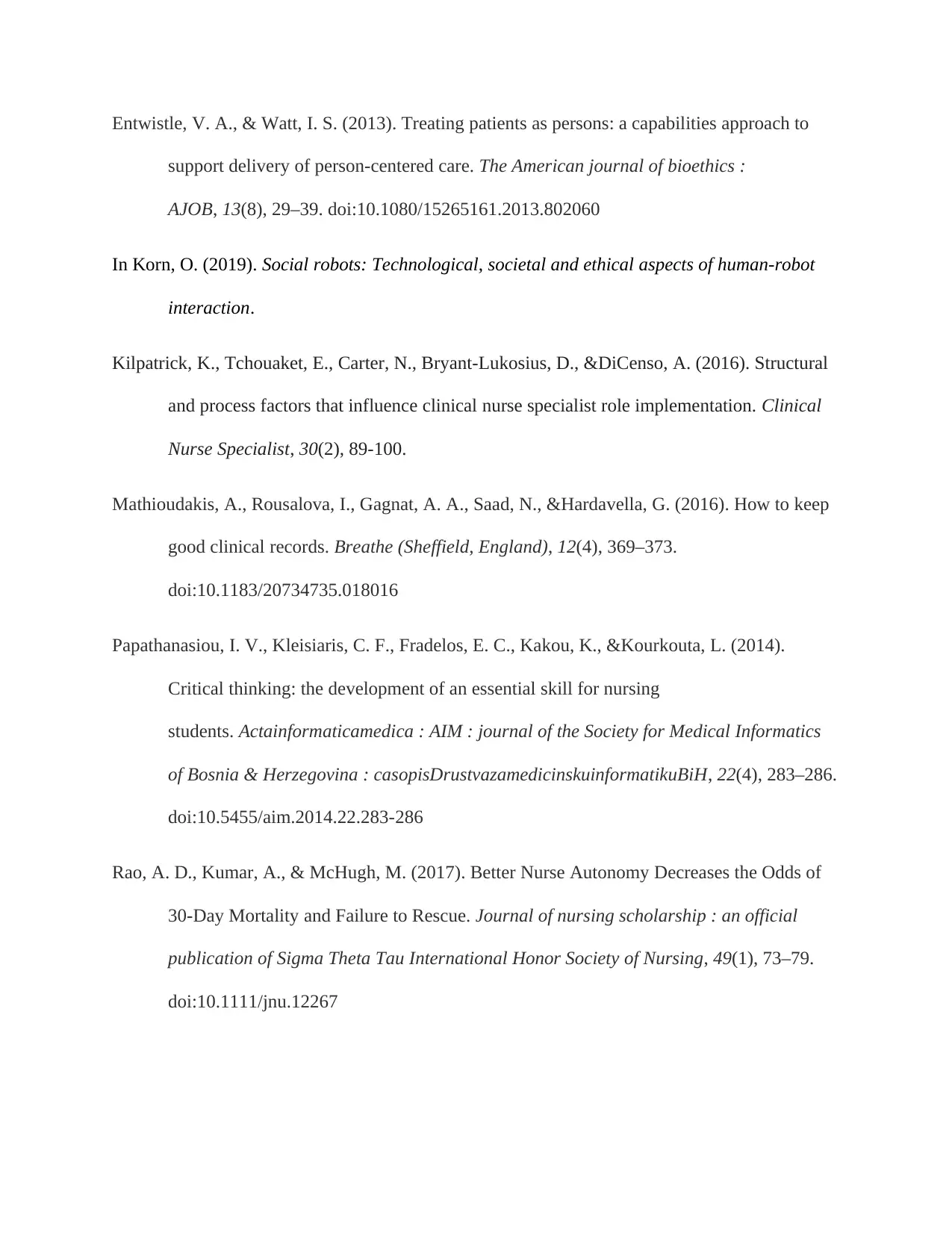
Entwistle, V. A., & Watt, I. S. (2013). Treating patients as persons: a capabilities approach to
support delivery of person-centered care. The American journal of bioethics :
AJOB, 13(8), 29–39. doi:10.1080/15265161.2013.802060
In Korn, O. (2019). Social robots: Technological, societal and ethical aspects of human-robot
interaction.
Kilpatrick, K., Tchouaket, E., Carter, N., Bryant-Lukosius, D., &DiCenso, A. (2016). Structural
and process factors that influence clinical nurse specialist role implementation. Clinical
Nurse Specialist, 30(2), 89-100.
Mathioudakis, A., Rousalova, I., Gagnat, A. A., Saad, N., &Hardavella, G. (2016). How to keep
good clinical records. Breathe (Sheffield, England), 12(4), 369–373.
doi:10.1183/20734735.018016
Papathanasiou, I. V., Kleisiaris, C. F., Fradelos, E. C., Kakou, K., &Kourkouta, L. (2014).
Critical thinking: the development of an essential skill for nursing
students. Actainformaticamedica : AIM : journal of the Society for Medical Informatics
of Bosnia & Herzegovina : casopisDrustvazamedicinskuinformatikuBiH, 22(4), 283–286.
doi:10.5455/aim.2014.22.283-286
Rao, A. D., Kumar, A., & McHugh, M. (2017). Better Nurse Autonomy Decreases the Odds of
30-Day Mortality and Failure to Rescue. Journal of nursing scholarship : an official
publication of Sigma Theta Tau International Honor Society of Nursing, 49(1), 73–79.
doi:10.1111/jnu.12267
support delivery of person-centered care. The American journal of bioethics :
AJOB, 13(8), 29–39. doi:10.1080/15265161.2013.802060
In Korn, O. (2019). Social robots: Technological, societal and ethical aspects of human-robot
interaction.
Kilpatrick, K., Tchouaket, E., Carter, N., Bryant-Lukosius, D., &DiCenso, A. (2016). Structural
and process factors that influence clinical nurse specialist role implementation. Clinical
Nurse Specialist, 30(2), 89-100.
Mathioudakis, A., Rousalova, I., Gagnat, A. A., Saad, N., &Hardavella, G. (2016). How to keep
good clinical records. Breathe (Sheffield, England), 12(4), 369–373.
doi:10.1183/20734735.018016
Papathanasiou, I. V., Kleisiaris, C. F., Fradelos, E. C., Kakou, K., &Kourkouta, L. (2014).
Critical thinking: the development of an essential skill for nursing
students. Actainformaticamedica : AIM : journal of the Society for Medical Informatics
of Bosnia & Herzegovina : casopisDrustvazamedicinskuinformatikuBiH, 22(4), 283–286.
doi:10.5455/aim.2014.22.283-286
Rao, A. D., Kumar, A., & McHugh, M. (2017). Better Nurse Autonomy Decreases the Odds of
30-Day Mortality and Failure to Rescue. Journal of nursing scholarship : an official
publication of Sigma Theta Tau International Honor Society of Nursing, 49(1), 73–79.
doi:10.1111/jnu.12267
⊘ This is a preview!⊘
Do you want full access?
Subscribe today to unlock all pages.

Trusted by 1+ million students worldwide
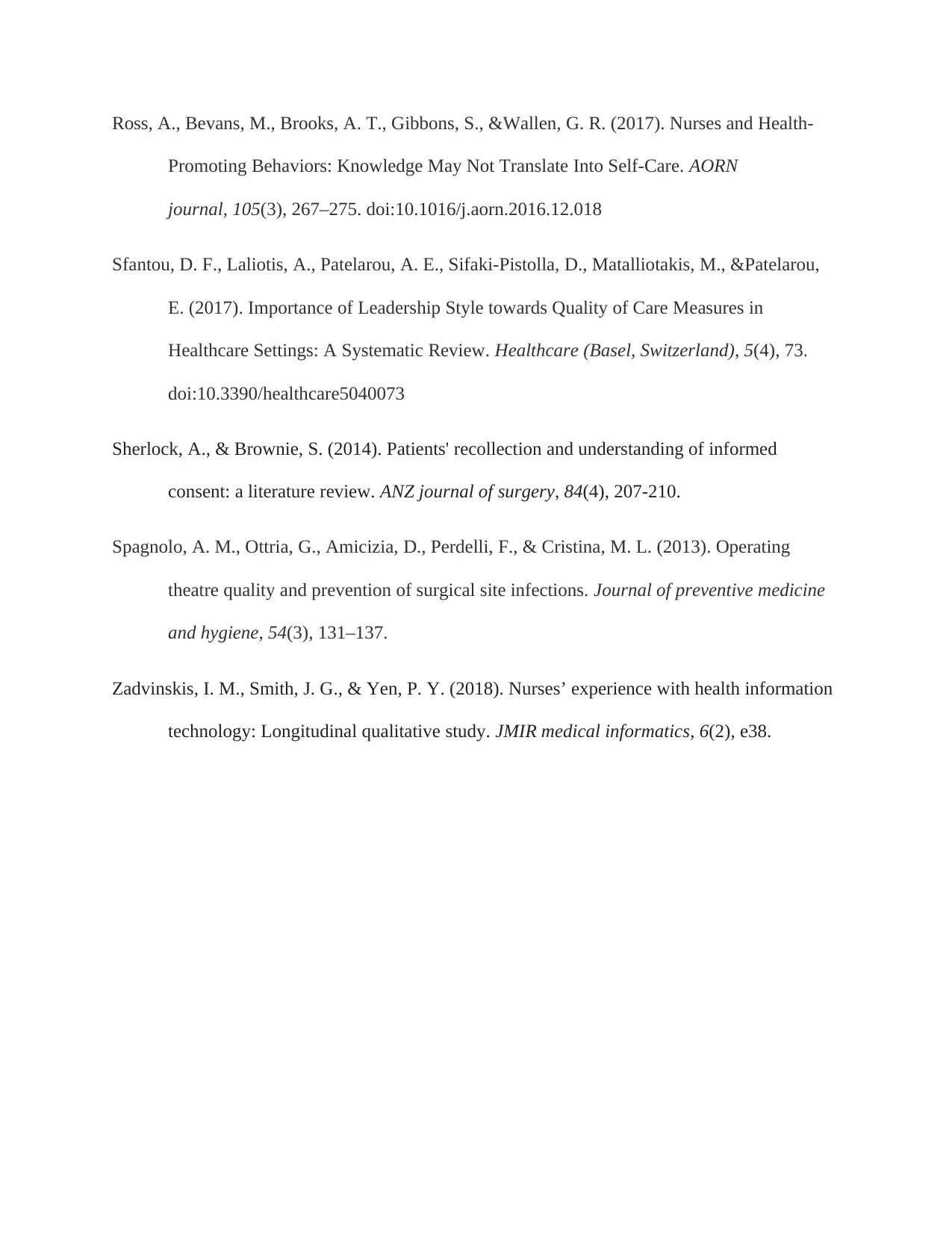
Ross, A., Bevans, M., Brooks, A. T., Gibbons, S., &Wallen, G. R. (2017). Nurses and Health-
Promoting Behaviors: Knowledge May Not Translate Into Self-Care. AORN
journal, 105(3), 267–275. doi:10.1016/j.aorn.2016.12.018
Sfantou, D. F., Laliotis, A., Patelarou, A. E., Sifaki-Pistolla, D., Matalliotakis, M., &Patelarou,
E. (2017). Importance of Leadership Style towards Quality of Care Measures in
Healthcare Settings: A Systematic Review. Healthcare (Basel, Switzerland), 5(4), 73.
doi:10.3390/healthcare5040073
Sherlock, A., & Brownie, S. (2014). Patients' recollection and understanding of informed
consent: a literature review. ANZ journal of surgery, 84(4), 207-210.
Spagnolo, A. M., Ottria, G., Amicizia, D., Perdelli, F., & Cristina, M. L. (2013). Operating
theatre quality and prevention of surgical site infections. Journal of preventive medicine
and hygiene, 54(3), 131–137.
Zadvinskis, I. M., Smith, J. G., & Yen, P. Y. (2018). Nurses’ experience with health information
technology: Longitudinal qualitative study. JMIR medical informatics, 6(2), e38.
Promoting Behaviors: Knowledge May Not Translate Into Self-Care. AORN
journal, 105(3), 267–275. doi:10.1016/j.aorn.2016.12.018
Sfantou, D. F., Laliotis, A., Patelarou, A. E., Sifaki-Pistolla, D., Matalliotakis, M., &Patelarou,
E. (2017). Importance of Leadership Style towards Quality of Care Measures in
Healthcare Settings: A Systematic Review. Healthcare (Basel, Switzerland), 5(4), 73.
doi:10.3390/healthcare5040073
Sherlock, A., & Brownie, S. (2014). Patients' recollection and understanding of informed
consent: a literature review. ANZ journal of surgery, 84(4), 207-210.
Spagnolo, A. M., Ottria, G., Amicizia, D., Perdelli, F., & Cristina, M. L. (2013). Operating
theatre quality and prevention of surgical site infections. Journal of preventive medicine
and hygiene, 54(3), 131–137.
Zadvinskis, I. M., Smith, J. G., & Yen, P. Y. (2018). Nurses’ experience with health information
technology: Longitudinal qualitative study. JMIR medical informatics, 6(2), e38.
1 out of 10
Related Documents
Your All-in-One AI-Powered Toolkit for Academic Success.
+13062052269
info@desklib.com
Available 24*7 on WhatsApp / Email
![[object Object]](/_next/static/media/star-bottom.7253800d.svg)
Unlock your academic potential
Copyright © 2020–2026 A2Z Services. All Rights Reserved. Developed and managed by ZUCOL.





